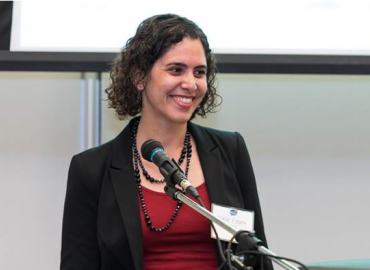 We’re very happy to introduce you to our post-doctoral fellow, Dr. Dikla Yogev, who will oversee our Workplace Democracy Project and its expansion to the national stage.
We’re very happy to introduce you to our post-doctoral fellow, Dr. Dikla Yogev, who will oversee our Workplace Democracy Project and its expansion to the national stage.
Dikla is a sociologist currently holding a postdoctoral position at the University of Toronto with expertise in social network analysis and advanced statistics. Her research has been published in peer-reviewed journals such as Contemporary Jewry, Policing & Society, and International Criminology, focusing on topics concerning religious communities, the police, and the state.
In addition to the Workplace Democracy Project, she is also serving as the project manager for the SSHRC funded Bais Yaakov Project led by Prof. Naomi Seidman in the Department for the Study of Religion. Her current research is centered on community organization, social networks, and democracy, employing various methods including digital and computational techniques.
We had the opportunity to sit down with Dikla to talk about her post-doctoral work, the evolution of the Workplace Democracy Project, and what she's looking forward to most as she oversees one of our most expansive, cross-country initiatives.
Let’s start with your overarching research interests and your most recent post-doctoral work in the University of Toronto's Anne Tanenbaum Centre for Jewish Studies. What are you working on at the moment?
My work focuses on the policing of religious communities, specifically the Haredim (Ultra-Orthodox Jews) in Israel, and whether there’s been a positive or negative change in trust/cooperation with police. Generally, marginalized communities have a deteriorating relationship with law enforcement, so my working assumption was that we might see a negative tendency among this community. Surprisingly, I’ve found a general increase in trust since the year 2000, so I’ve decided to look at major events that shape community’s “collective memory,” and what I call “enablers of trust” to explain this outcome. I’ve identified two major enablers: professional knowledge brokers and civil society organizations.
Community members with higher education (who happen to also work in public spaces) act as professional brokers. They translate messages from more insular, isolated communities to the public, and vice versa, playing a pivotal role, for example, in promoting health messaging during the COVID-19 pandemic. Non-profit, civil society organizations are also doing important work, not in the Orthodox community itself, but in the public sphere. They provide a “safe space” for Haredim who are trying to learn more about the public, and secular Israelis who are given an opportunity to get acquainted with Haredim.
These two major mechanisms have led the community to be more comfortable with cooperating with police and reporting offenses, but also allow the police to be more involved in various cases and to prove beneficial for the community in matters (such as child abuse) that were previously solved internally.
What drew you to the National Assembly on Workplace Democracy Project, and how will it build upon the work of the Ontario Assembly on Workplace Democracy?
My research has grown from analyzing trust in the police to trust more broadly – one’s trust in the state, the workplace, unions and institutions. It was through this expansion in my research that I learned about the Centre’s Ontario Assembly on Workplace Democracy, a truly one-of-a-kind initiative that aimed to investigate the voice gap among Ontarians and, in doing so, develop a better understanding of how workers’ concerns could be adequately heard and represented.
As far as I know, there has been no prior use of a citizens’ assembly to understand the role and perception of worker voice or unions, and the insights that were gleaned were valuable enough for the project to be replicated on a national level. In addition to replicating the assembly, we’ll be adding a pre- and post-survey to assess the perceptions of, not only assembly members, but the public more generally.
And finally, what are you most looking forward to about the project?
National projects in Canada highlight the country's diverse landscape, from Quebec's unique union activities, to Ontario's distinct labor dynamics, to other provinces and territories. This diversity makes these projects intriguing, offering insights into Canada's multifaceted regions. Additionally, I am privileged to work with an excellent team, blending different ideas and expertise, ultimately enriching the project both academically and practically.


